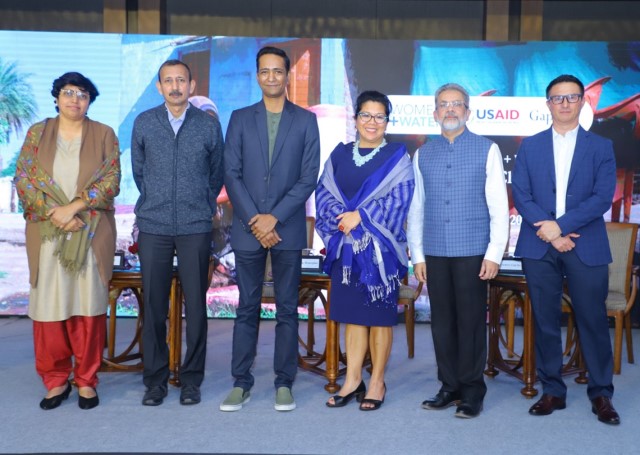The successful partnership aimed to empower women and mobilize communities to serve as change agents for advancing WASH practices concluded with a workshop in Delhi
- Since 2019, The Women + Water Alliance, supported by USAID (U.S. Agency for International Development) and Gap Inc. has empowered women and mobilized communities to serve as change agents for advancing WASH practices in select districts of Madhya Pradesh & Maharashtra. WaterAid India is one of the Alliance implementing partners, including CARE International, Water.org, and the Institute for Sustainable Communities.
- Through the project, WaterAid India successfully reached out to 2,400 villages from 40 blocks in seven districts.
- WaterAid India trained3,541 of Village Water & Sanitation Committee (VWSC) members and 3,089 of Panchayati Raj Institution (PRI) members on management of Pipe Water Supply Schemes, convergence, and water security.
- 185 volunteers were trained on the operation and maintenance of piped water supply. 13,799 women and youth have been trained on the use of field-testing kits.
NEW DELHI: Convened to mark the successful conclusion of the Women+Water Alliance project in select districts of Madhya Pradesh and Maharashtra, USAID, Gap Inc., and Alliance partners, including WaterAid India organized a workshop on 12th December 2022 in Delhi.
Implemented by WaterAid India, and other organizations including CARE International, WaterAid India, Water.org, and Institute for Sustainable Communities (ISC), Women+Water is a six-year (2017-2022) Global Development Alliance between USAID (U.S. Agency for International Development) and Gap Inc. The Alliance is committed to improving and sustaining the health and well-being of women and communities touched by the apparel industry in India.
Welcoming all partners and guests, Judy Adler, Vice President, of Global Sustainability & ESG, Gap Inc., and President, of Gap Foundation said “Gap Inc. is focused on water conservation and women empowerment, creating water champions in the communities and building water resilience. We believe that availability of water is a human right and is a critical natural resource not only for the health and well-being of our community, but also to carry out business activities.”
Shedding light on WaterAid India’s role in the W+W Alliance, VK Madhavan, Chief Executive, of WaterAid India said the focus was on enabling equitable and inclusive access to clean water to people at all levels. He further added, “The Alliance has given us the opportunity to work with other civil society organizations, driving collective impact and attaining the scale that matters. We have been facilitating the creation of village action plans by community members, in establishing community-led water quality monitoring & surveillance, grooming women leaders; and in building the capacity of local village-level institutions”.
Proceeding with the workshop, Ella Lazarte, Senior Water, and Sanitisation Advisor, USAID shared how the program was instrumental in achieving three things- “Conscious collaboration between all stakeholders including communities, private sector, and Government; creating women leaders and supporting them to advocate for clean water and sanitation; and strengthening institutions to usher transformational change in the society.“
Strengthening the Jal Jeevan Mission (JJM), WaterAid India implemented the program while adhering to the guidelines of JJM and worked in collaboration with the local administration in Madhya Pradesh and Maharashtra. A key priority of this partnership is to bolster community-level activities and women’s leadership by providing handholding support to Village Water & Sanitation Committees & Panchayati Raj Institution members. The project ensured putting systems and processes in place to ensure equitable distribution of drinking water to all households and plan for the sustainability of the piped water supply schemes in a participatory and transparent manner.
The project successfully reached and benefited over 7 districts with 40 blocks and 2400 villages and prioritized key interventions like advancing WASH practices in communities via women leadership, strengthening the system by building capacity, and community-led water quality monitoring & surveillance and planning. Furthermore, the alliance focused on helping the community understand concepts and translate knowledge into action, effectively grooming the community to lead and sustain the scheme after the intervention.
Key Highlights of the Project
- Supported the department in developing community-led Village Action Plans (VAPs) in 2,297 villages. Of the 2,297 VAPs developed, 2057 VAPs were approved by the department.
- 13,799 women & youth have been trained on the use of field testing kits to strengthen water quality monitoring & surveillance.
- 3,541 Village Water & Sanitation Committee (VWSC) members have been trained on institutional, technical, and financial aspects of the operation & maintenance of Pipe Water Supply Schemes (PWSS).
- In addition to this, 3,089 Panchayati Raj Institution (PRI) members were trained on the management of piped water supply schemes (PWSSs), convergence, and water security, 2,037 women were trained to increase their leadership on water-related activities in the village and increase their active participation in Gram Sabhas.
- 991 villages have started water tariff collection and lastly, about 185 individuals have been trained at the village level as pump operators to support operation and maintenance.
Other prominent partner organizations that were at the forefront of this intervention program, present at the event included Samarthan (Sehore, Indore, Khandwa), Centre for Advanced Research & Development – CARD (Dhar and Dewas), and National Institute for Women Child and Youth.


